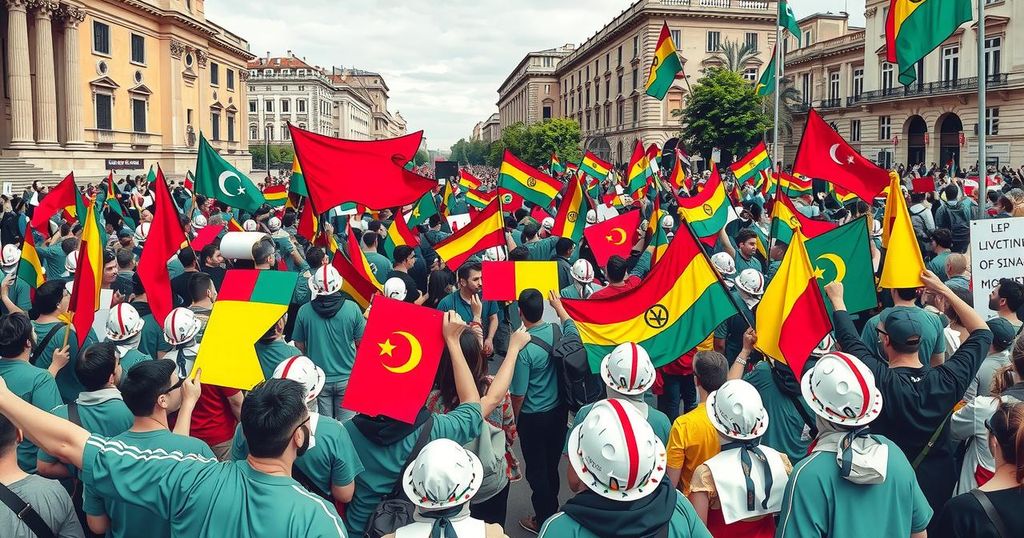Politics
AFRICA, AP, ASIA, BARACK OBAMA, BURKINA FASO, CONFEDERATION OF SAHEL STATES, CORRUPTION, DAKAR, DEMOCRACY, EUROPE/ASIA, HUMAN RIGHTS, IBRAHIM TRAORE, IRAQ, IVORY COAST, KARAMOKO JEAN MARIE TRAORE, LANGLEY, MOROCCO, MOSCOW, NIGER, OF SAHEL, OUAGADOUGOU, PLACE DE LA REVOLUTION, PROTESTS, RUSSIA, SAHARA, SAHEL, SENATE COMMITTEE, SENEGAL, SERGEY LAVROV, U. S, U. S. SENATE
Fatima Khan
0 Comments
Supporters Rally in Burkina Faso for Military Junta Amidst Turmoil
Thousands protested in Ouagadougou rallying in support of Burkina Faso’s military junta led by Capt. Ibrahim Traore, following accusations from U.S. military officials regarding mismanagement of national resources. The rally, amidst ongoing security issues and the junta’s controversial ties to Russia, highlighted deep tensions between local supporters and foreign critics.
On Wednesday, thousands took to the streets of Ouagadougou, Burkina Faso, demonstrating their support for the military junta following an alleged coup attempt. This rally appears to be a response to accusations made by U.S. military officials against the junta leader, Captain Ibrahim Traore. The atmosphere at the Place de la Revolution was charged, with protestors chanting patriotic slogans and holding banners denouncing foreign criticism.
In recent developments, the military government claimed to have thwarted a significant conspiracy aimed at overthrowing Capt. Traore. Allegedly, the plotters were based in neighboring Ivory Coast, heightening tensions in the region. This situation has emerged in the backdrop of a testimony given by General Michael Langley, the head of U.S. military operations in Africa, who criticized the junta, stating their utilization of the nation’s gold reserves is detrimental to the local populace.
Demonstrators rallied passionately, expressing their solidarity with Traore. Among them was musician Ocibi Johann, who dismisses the American accusations. “Because Colin Powell lied, Iraq was destroyed. Barack Obama lied, Gaddafi was killed… this time, their lies won’t affect us,” he stated. His comments reflect a broader skepticism towards U.S. motives in the region. Some attendees even took to creatively protesting, illustrating the word “slave” over Gen. Langley’s image.
Burkina Faso, along with Niger and Mali, has faced increasing security threats from jihadist groups for over a decade now. Following the military coup in Burkina Faso in September 2022, Capt. Traore was promised to lead the country towards safety and prosperity. Yet, more than a year later, reports indicate over 60% of the country is effectively outside government oversight, with millions displaced and in need of humanitarian aid.
As the situation deteriorates, the junta’s reliance on military partnerships with Russia has grown, especially after severing ties with Western forces, including the U.S. and France. Ironically, the military was previously reliant on U.S. bases in Niger until the latter ended their military agreement.
Some protestors traveled great distances to attend the rally, looking to convey their support for Traore, like Sekou Ansumariam Dukaly from Liberia. “He represents hope for Africa, hope for Black people, hope for all freedom fighters around the globe,” he proclaimed, showcasing the fervent desire for change among supporters.
However, the junta’s struggle against the ongoing insurgency raises questions about its effectiveness. Human rights organizations have documented numerous abuses during counterinsurgency efforts by the armed forces and militias, including unlawful killings. Amidst rising unrest, the ruling military has allegedly enforced a censorship regime, stifling dissent and fostering a climate of fear, where voicing opposition could lead to severe consequences.
In summary, Burkina Faso’s rally showcased the strong support for the military junta against the backdrop of alleged external criticism and regional security challenges. Despite the initial hopes tied to Capt. Traore’s leadership, the junta faces significant hurdles in governing effectively and addressing prevailing violence. Meanwhile, the alignment with Russia signifies a major shift in Burkina Faso’s military partnerships, distancing itself from Western nations. With increasing reports of human rights abuses and censorship, the situation remains precarious as the country searches for stability amid chaos.
Original Source: apnews.com




Post Comment